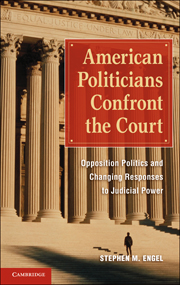 American Politicians Confront the Court
American Politicians Confront the Court Book contents
- Frontmatter
- Contents
- Acknowledgments
- Introduction
- PART I POLITICAL DEVELOPMENT AND ELECTED-BRANCH RELATIONS WITH THE JUDICIARY
- PART II HOSTILITY TO JUDICIAL AUTHORITY AND THE POLITICAL IDIOM OF CIVIC REPUBLICANISM
- 3 In Support of Unified Governance
- 4 Party against Partisanship
- 5 “As Party Exigencies Require”
- PART III HARNESSING JUDICIAL POWER AND THE POLITICAL IDIOM OF LIBERAL PLURALISM
- On the Return of Opposition Illegitimacy and the Prospects for New Development
- Index
- References
4 - Party against Partisanship
Single-Party Constitutionalism and the Quest for Regime Unity
Published online by Cambridge University Press: 05 June 2012
- Frontmatter
- Contents
- Acknowledgments
- Introduction
- PART I POLITICAL DEVELOPMENT AND ELECTED-BRANCH RELATIONS WITH THE JUDICIARY
- PART II HOSTILITY TO JUDICIAL AUTHORITY AND THE POLITICAL IDIOM OF CIVIC REPUBLICANISM
- 3 In Support of Unified Governance
- 4 Party against Partisanship
- 5 “As Party Exigencies Require”
- PART III HARNESSING JUDICIAL POWER AND THE POLITICAL IDIOM OF LIBERAL PLURALISM
- On the Return of Opposition Illegitimacy and the Prospects for New Development
- Index
- References
Summary
The Chase impeachment set an ideal of judicial independence as political neutrality, but it hardly resolved the underlying antagonism with the judiciary. By showing that the federal judiciary could not easily be brought into alignment with the other branches, the impeachment began to unravel the idea of regime unity among political leaders; however, it did not diminish their hope that it could be achieved. As this chapter details, the Framers' presumptions of such unity and corresponding fears about federal consolidation against states' rights continued to color politicians' actions well into the next generation. But ideas about opposition also continued to evolve, and with them came a new attitude toward the judiciary. This chapter examines that evolution during the Jacksonian era (1828–60), which witnessed changes in how politicians viewed parties, the opposition's right to rule, and the advantages and threats posed by judicial power. More specifically, it draws out connections among these dynamics.
The Jacksonian era lacked the explosive anti-judicial hostilities of the early Jeffersonian years. This was a relative calm, at best, but the contrast with what came before is indicative of a newly emergent state of affairs. These years mark an intermediate stage between Jeffersonian attempts to undermine judicial authority when it could not be brought to heel and later Lincolnian attempts to manipulate judicial power to implement a particular political party's constitutional vision.
- Type
- Chapter
- Information
- American Politicians Confront the CourtOpposition Politics and Changing Responses to Judicial Power, pp. 131 - 169Publisher: Cambridge University PressPrint publication year: 2011


